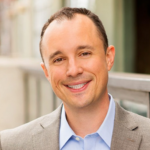 Ray Cotton is the current ASIS San Francisco Chapter Chair and works for Orchard Supply Hardware in the capacity of Director of Security Operations responsible for corporate security, logistics security, executive protection and organized retail crime Investigations.
Ray Cotton is the current ASIS San Francisco Chapter Chair and works for Orchard Supply Hardware in the capacity of Director of Security Operations responsible for corporate security, logistics security, executive protection and organized retail crime Investigations.
“Whenever I am approached by someone new to the industry or a Criminal Justice Student, I always point them toward the best resources in the industry: The Loss Prevention Foundation, ASIS International, The National Retail Federation and Loss Prevention Magazine”
What do you do in the security Industry?
At my company (OSH) I am responsible for Corporate Security, Logistics Security, Executive Protection and Organized Retail Crime Investigation. In addition, I am a huge supporter of ASIS and the Loss Prevention Foundation. In my opinion, these organizations really set the bar for what it means to be a security professional.
What do you do for Orchard Supply Hardware?
I work for Orchard Supply Hardware in the capacity of Director of Security Operations. Orchard is a 70 year old hardware retailer based in California; OSH has over 80 locations, 7000 associates and is well known throughout California for having top notch service and selection.
How did you originally get involved in loss prevention and security?
Most security and/or loss prevention professionals you ask this question to have a unique story, mine is no different. I grew up in a rural town in Northern Michigan and jobs were coveted by almost everyone. I was 16 when I got hired at the local K-Mart and they placed me in the Sporting Goods Department. After a while, I noticed the Loss Control Associates all seemed to really love their job and they noticeably had fun at it. K-Marts policies at the time prohibited anyone under the age of 18 working for the Loss Control department. I lobbied for over a year with the Regional Loss Control Manager until he finally relented and promoted me to a Loss Control Associate.
How is the economy affecting loss prevention?
In my opinion the security industry is now leaner in regards to senior positions. Many companies have folded or the companies have significantly downsized the Loss Prevention department altogether. Universally everyone states the same thing: times are tough, but they are getting better.
Do you see any new technology affecting loss prevention or the security market in general?
At OSH, we utilize ASPECT, LPMS, and The Retail Equation systems. OSH gets great returns on these products but I am really excited about some of the emerging technologies. A few months ago King Rogers introduced me to BVI Networks, which is based right here in San Jose. I really think this is the future of Loss Prevention in a lot of ways. BVI not only has massive shrink reduction implications it also is an equally strong partner to both Operations and Merchandising initiatives. This type of global impact and technology convergence is what the status quo in our industry will be in the near future.
Technology and specifically IP is changing security devices and how they are deployed. What do you think are the next big changes we will see?
Besides what I stated above, the other major player in the tech industry for Loss Prevention is Video Analytics. As the software gets better and the computers become faster, I see no limit to this technology.
Do you see wireless impacting security devices or loss prevention in general?
OSH has tried some of the wireless Loss Prevention devices on the market. I can tell you that so far, the devices have not matured enough for us to consider doing a company rollout, but I do like where the technology is going. On another note, I would say that if any new vulnerability exists to retailers, it’s the wireless device access points. I know some retailers have become victimized already through this portal, but I think it’s just the beginning.
What do you see as the security industry’s biggest challenge?
In the current economic environment, the biggest challenge is convincing your C- Level Executives that Loss Prevention is a necessary presence in your company. Seasoned executives like Bill Titus at Sears Holding, Keith White at the GAP and Brad Brekke at Target have little problem demonstrating value to senior executives. It’s the rest of us that take are understanding from these industry leaders that sometimes stumble in the translation.
How is the economy affecting your plans for future development?
The economy has made development and/or training challenging for everyone in the company. Conferences and trips that were never questioned now need full explanations and have accompanied ROI analysis. Fortunately, although the approval process has been slowed, it certainly has not stopped. I feel fortunate that I work for a company that values and understands the need to take outside training and development classes.
As an executive leader and Chair of the San Francisco Chapter of ASIS International, what would you say to a student looking at security as one of their career options?
Whenever I am approached by someone new to the industry or a Criminal Justice Student, I always point them toward the best resources in the industry: The Loss Prevention Foundation, ASIS International, The National Retail Federation and Loss Prevention Magazine. In regards to what career choices are available; I would say that the only limitation is the student’s imagination and/or drive. In my opinion, its best to start at the ground floor and work your way through the positions. For some, that means starting as a plain clothes detective or a uniformed guard. I think starting entry level for any job, gives you a greater understanding and deeper respect for what it means to work on the front lines for that company.

